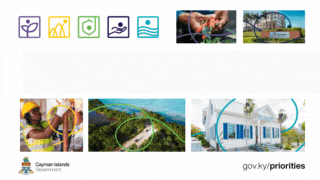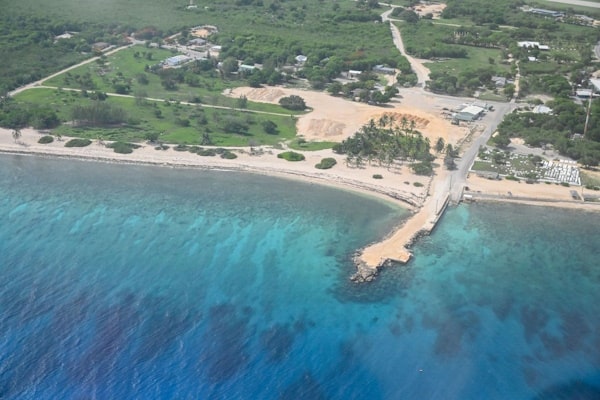Civil service body wants in on talks over change
(CNS): Public servants need to be consulted on plans to cut benefits for government workers, the president of the Cayman Islands Civil Service Association has said in a letter to the deputy governor. James Watler warned that the membership had to be involved in the creation of any proposals to change benefits or health cover to prevent “unworkable, anti-social proposals” with “unintended negative consequences”.
In his open letter to Franz Manderson, the boss of the organization, which is the closest thing Cayman has to a union, raised concerns regarding the recent announcement by Finance Minister Marco Archer that government was considering cutting the lifetime limit of health cover for government workers.
Alongside proposals for civil servants to begin making contributions from their salaries to their healthcare cover and pensions, as is the case in the private sector, Archer said during his budget address that government was exploring the possibility of reducing the lifetime cover of $5 million, possibly by more than half down to $2 million, which he said was common in the private sector.
However, Watler queried what cuts had been made in the cost of medical treatment since the last negotiations over a cut in maximum life cover that would enable it to be made without negatively impacting public servants.
“We recall that government insisted on the CINICO $5 million lifetime limit when a lower lifetime cap was proposed before in order to insure against future liabilities, having recognized the inadequacy of lesser coverage,” the president wrote. “We look forward to participating in any renegotiation of Civil Servant health coverage and learning what projected health care costs have gone down since the last round of negotiations that will allow the government to now consider reducing coverage,” he said, making it clear that the service was unlikely to support the proposal.
The failure of government to supply the members of the CICSA with the draft policy on the increase in the retirement age from 60-65 for public sector workers, which is expected to be implemented in the coming months, Watler said, was causing uncertainty. He said there were no significant problems expected over the proposal but not having the draft policy to consider is causing “unnecessary fear, uncertainty, doubt and distrust” among civil servants.
Watler warned that whatever happens, the civil service wanted to be consulted and involved in potential changes.
“We expect to be part of the group looking at the business case for any co-pay and deductibles being considered since, based on past experiences with these issues, if the Civil Service is not directly represented at the beginning, including from setting the terms of reference of the review committee, we will again end up with unworkable, anti-social proposals that do not progress because of their unintended negative consequences to the Cayman Islands,” he told the deputy governor.
Watler said the civil service was willing to consider co-pay or other changes, provided there would be choice and it would be optional and fair. But he also spelt out the current objections of the membership.
“The Civil Service will not be taxed to further subsidise the health system utilized by the entire country,” Watler stated in his letter, especially when, “as the Premier has repeatedly recognized, the Civil Service has worked tirelessly to facilitate the Government’s programmes and has achieved surpluses in excess of even ambitious budget projections”.
Among the suggestions being made to cut the government’s personnel expenses, he pointed to proposals made by the service that spouses working in the private sector could be covered by their employers rather than under the government plan.
Watler said he was grateful for the 4% pay uplift promised for the new financial year to replace the lost cost of living allowance of 3.2% that was taken from government workers in 2010, which had caused considerable hardships for some of government’s lower paid workers.
He said his members were committed to engaging with government but they needed to be kept informed about “what is being considered for them by the powers that be”.
But the association leader added that “finding a way forward will be harder with persons outside the service attempting to paint the service as anti-Cayman”.
Category: Jobs, Local News





































You may understand one thing but until Government puts it in writing we know nothing. And that is the rub and all they are asking for. Don’t just bandy words, put them on paper so people will know what you mean. (Or, more accuratelly I bet, publish the paper.) For your further understanding the Government Companies are seperate from both the private sector and the civil service. They are neither fish nor fowl and so which rules apply to them is impossible to guess ahead of time.
You do contribute. Your health insurance is part of your pay package. If they want to renegotiate your pay package thats fine. But they don’t want to do that. They want to cut your pay to subsidise losses at the HSA.
Many very valid points are being raised! I am a civil servant (healthy) and haven’t used the services of the George Town hospital in perhaps umm…8 months and I think I might go there for service about once every year or so. The service is so mixed and questionable at times that I just don’t even chance it. I think the government should just come out of the hospital business or only retain the functions that the private sector doesn’t want like OBGYN birthing. Go ahead and keep the district health facilities and let them crowd up if necessary to make not having insurance woefully painful. And retain some sort of emergency service at one of those district health facilities for uninsured persons to patch up and get ready to go. Ideally the emergency clinic will be at the airport so people know it is “out” when you don’t arrange insurance for yourself. Tourist need to have an extra tax to have temp health coverage and all work permit holders need to buy insurance to cover emergency medical evacuation directly from CIG immigration that covers anything that is expected to be a bill larger than CI $20,000.00 unless you can prove that you have insurance which has a limit of CI $500,000.00 and has acknowledged and guaranteed in advance that it will cover your bill. If a couple of their coveted clients start getting shipped off they will change their practice and start paying the bills on more than the honour system which is causing the $80 million shortfall.
The cruise ship industry must set up a fund to cover its visitors or pay the same as the work permit plan above.
Now, for the employers who don’t cover their employees well that should be a jail term instead of a fine- take some of the savings from the above a build a special jail just for them on Cayman Brac (might boost the economy). And lastly, civil servants pay co-pay but the government must accept its lack of foresight and pay for a breach of contract at say 5% of the average cost of the co-pay per civil servant reflecting the time period left in service.
Trying the easy fix of just cutting benefits is a nice try but if one looks at the constitution it can be found out that the cutting of any benefit is disallowed. But, it is so easy to just glaze over a document like the constitution and if I was Mr. Watler I would be pointing to the violation of the Cayman Islands Constitution but I suspect that is not the route one would want to go down since the Government is already in breach of that with the reduction of benefits following the financial crisis. Perhaps, the kind folks at the Cayman Compass will shoot a headline like that instead….” Government Proposal Suggests Violation of Cayman Islands Constitutional Order 2009″
The failure of government to supply the members of the CICSA with the draft policy on the increase in the retirement age from 60-65 for public sector workers, which is expected to be implemented in the coming months, Watler said, was causing uncertainty. He said there were no significant problems expected over the proposal but not having the draft policy to consider is causing “unnecessary fear, uncertainty, doubt and distrust” among civil servants.
Did he really say that? If you need to see a draft policy on a simple statement like “Raise the retirement age from 60 to 65” then how in the hell can anyone discuss more complex policies with multiple independent variables with someone like that?
Seems fairly obvious that the details matter.
Is government really going to come in and tell someone who is 59 years and 11 months old that retirement is suddenly 5 years further down the road rather than next month?
Is the raised retirement age to apply only to new hires? To current employees above a certain age? What age?
Does government call back recent retirees to make them work to age 65 for a full retirement benefit?
don’t forget what about if the worker was born on the 29 February in a leap year, does that mean he has to be effectively 260 before he can retire.
So many questions
The Hon. Marco Archer appears to trying to meet a quota [of some sort], at any cost to the Caymanian Civil Servant and their families? Just when the government realized it was too risky to cut employees, Mr. Archer then focuses on cutting employment benefits, instead — the simple & easy way of reducing the HSA debt.
Rather than making the assumption that the government’s hefty HSA bill/receivables are mostly attributed to Civil Servants’ use of the facilities, perhaps he should delve into the number of uninsured persons living and/or working on island.
A thoroughly analysis of these cost drivers would be a good start. Then he can lean on the other ministries to ascertain what category of these individuals attribute to the HSA’s “big bill”, and what should be done about it.
The most high-risky individual is obviously the uninsured, non-resident alien (i.e. visitors, work permit holders, dependents, etc.) and the unemployed resident and citizen, between ages 18-55.
This means the PPM will need to consider enforcing some tough policies (involving the immigration ministry, employment ministry, and health ministry) without adding to the country’s prevailing struggles.
Household Income > Affordable (basic) insurance coverage cost; HSA Cost Control = Laws, mandating health insurance as a working and living requirement [in the Cayman Islands]
Hard to see how cutting Civil Service employee benefits will reduce HSA debt. Sure, it would reduce government’s costs, but HSA debt arises from uninsured and underinsured patients.
I am a CIG worker and feel we should be contributing. If I lived in any other country I would be paying income tax, national insurance and contributions towars a lension plan. It is unrealistic to assume the private sector shoukf continue to fund us so hansomely. Obviously there would have to be ci teibutions based on income.
You know, it is people like you and the president of CICSA that contribute to the negative impression held by the general public when it comes to Civil Servants. Sometimes you simply need to show restraint in your utterances. At the very least, take a moment to review your words before you put them out to the public.
suggest you take your own advise.
I would like government to please let us know at what age, or from what diseases, do we lose our right to health care. This question is not relevant to the wealthy, but to most of the population it is. Government would have allot more funds to Hospice as there would be a time when you would need it. Not because modern medicine could not help, but because government will have decided you are not worthy of treatment.
Think about it because that it the bottom line.
Ah good old CICSA. It’s always TAKE, TAKE, TAKE with that bunch. Try contributing to your own benefits like those of us in the private sector.
I don’t mind paying my premium, but I must also then have the choice to seek the services of any health care provider I see fit. This notion of me paying but being forced to use the HSA cannot fly.
People should really look into the real reason that the premiums for health insurance with CINICO is so high. The fact is, when the national insurance law was created, it allowed the insurance companies to cherry-pick all the healthy individuals; leaving the rest for Government to pick up the cost of insuring them. This is why CINICO was created!!! To offset the cot of CINICO carrying the burden of the “uninsurable”, the Civil Servants are charged these high rates.
CINICO covers the veterans, seaman’s and everyone else that cant afford insurance from the private market. That is why there is such a high price tag.
Another issue that needs to be addressed is the fact that the they want to extend the retirement age for civil servants only. What about statutory authorities? I don’t hear anything about that. SAC’s need to stand up for their rights!
The retirement age is to be increased across the board for the entire country, as I understand it. Not just for persons working for a government entity. Also realise that the decision to retire is really up to each and every individual. There is nothing stopping anyone from retiring a 35 or 40 or 50, etc. This proposal is really just about setting a top age and still there would be nothing stopping a person from continuing to work if they can find employment after that top age.